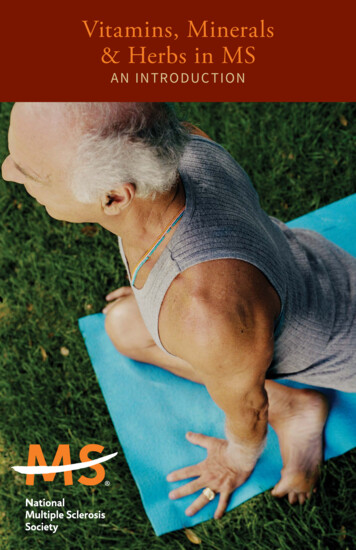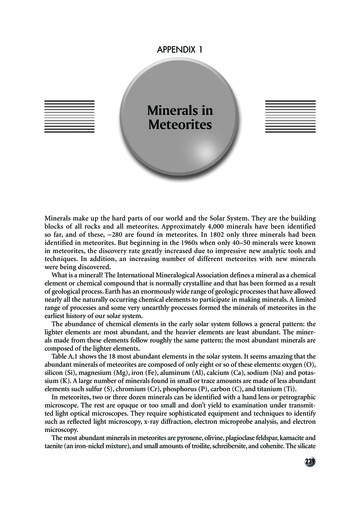
Transcription
Vitamins, Minerals& Herbs in MSA N INTRODUC TION
Eric (front cover), diagnosed in 1951.
Vitamins, Minerals& Herbs in MSA N INTRODUC TIONBY: A LLEN BOW LING, MD, PHDAllen Bowling, MD, PhD, is Physician Associate at theColorado Neurological Institute (CNI) and Clinical Professorof Neurology at the University of Colorado.This publication is supported by contributions to theNational Multiple Sclerosis Society from its membersand friends. 2018 NATIONAL MS SOCIETY. ALL RIGHTS RESERVED.
IntroductionMultiple sclerosis (MS) is a highly unpredictable disease ofthe central nervous system that commonly causes relapsesof neurological symptoms and worsening of symptoms overtime. Disease modifying therapies (DMT’s), approved by theUS Food and Drug Administration (FDA), can modify theMS disease process and slow worsening. However, despitethe use of DMT’s, many people experience symptoms thatinterfere with daily activities. Many people take supplementsin an effort to reduce symptom severity —and with the hopeof potentially impacting the MS process.There is considerable popular literature suggesting benefitsof many supplements for MS and this booklet providesinformation on the potential benefits as well as the knownrisks of commonly used vitamins, minerals and herbs.Dietary supplements, such as those discussed in thisbooklet, are not studied with the same rigor as FDAapproved medicines for MS and sometimes little is knownabout risks and possible benefits. It is important to alwaysdiscuss any supplements you are taking or are consideringwith your MS provider.For additional information on supplements and othercomplementary treatments, see the reference section onpage 23.1 Vitamins, Minerals & Herbs in MS
General Information forEvaluating SupplementsTo weigh the pros and cons of dietary supplements fairlyrequires a basic understanding of the role of the immunesystem in MS. Thoughtful supplementation also requires anunderstanding of evidence about safety and effectiveness,dosing issues, and the law relating to supplements.Impact of MS on the Immune System: In MS, theimmune system actively damages myelin (the protectivecovering of nerves) in the brain and spinal cord (thecentral nervous system). Most treatments for MS involvethe attempt to down-regulate the immune system.The details of the immune system are very complex, butin general it may be best to assume that in MS, immunestimulation may be dangerous and immune down-regulationmay be beneficial. Accordingly, supplements that are supposedto “boost” or “improve” immune function may be the worstchoice for people with MS.Unfortunately, the immune effects of many supplements arepoorly understood. Often the use of supplements requiresusers to make reasonable inferences based on limited evidence.However, inferences may seem reasonable and still be incorrect.Evidence of Effectiveness, Safety and Risks: In additionto adverse immune system effects in MS, supplementsmay provoke MS symptoms, interact with common MSmedications, or have serious side effects. More than 200National MS Society 2
different supplements may produce these types of negativeeffects in MS. Some of these supplements will be discussedin this booklet. A more detailed listing of these potentiallyharmful supplements may be found in Optimal Healthwith Multiple Sclerosis: A Guide to Integrating Lifestyle,Alternative, and Conventional Medicine, by AllenBowling, MD, PhD. (page 378).Often what is used to support the use of supplements is simplya story, sometimes called “anecdotal evidence.” This is the leastreliable of all the various kinds of evidence. Particularly in MS,where symptoms come and go unpredictably, improvement insymptoms may appear to be related to the use of supplementswhen it is not.The best evidence is generally obtained from carefullycontrolled trials among a large group of people with MS.Another source of evidence is animal studies. These studiescan be helpful, but may also be misleading because substancesmay work very differently in animals than they do in humans.Evidence can also be obtained from experiments done inlaboratories. Again, these studies are helpful, but can’t beconsidered definitive in any way.Dose Matters: Dose is a critical factor with any medicationor supplement, and more is not always better. Supplementsmay have different effects depending on the size of the dosethat is taken. While a small amount of certain supplementsmay be useful, larger amounts may be dangerous. Proper doseshould always be considered before beginning supplementation.Therein lies a challenge however, because the ingredients insupplements are generally not clearly labeled.3 Vitamins, Minerals & Herbs in MS
Absence of Regulation: In the United States, supplementsare not regulated in the same rigorous way that medicationsare. Before being marketed, medications must undergocontrolled clinical trials that demonstrate their effectivenessand safety for the treatment of particular medical conditions.This is in sharp contrast to dietary supplements. Manufacturersof supplements are not required to prove the effectiveness oftheir products or accurately report what is contained in them.As a result, supplements may contain varying amounts ofthe active ingredients and be of variable quality. Consequently,users of any supplements should be cautiously skepticalwhen reading marketing information from the seller and,in general, be mindful of the fact that the U.S. Food andDrug Administration (FDA) has not evaluated the productfor efficacy or safety. For this reason, the labels of dietarysupplements are not permitted to make specific claims totreat or cure any particular illness.Specific InformationAbout Select Vitamins,Minerals and HerbsThe number of available vitamins, minerals and herbs is toogreat to catalog here, so we have included those that manypeople with MS choose to use.National MS Society 4
VitaminsVitamins are a group of organic compounds that areneeded for cell function, growth and development. Mostvitamins are obtained through the foods we eat or fromdietary supplements. The Food and Nutrition Board of theNational Academy of Sciences has established a recommendeddaily allowance (RDA) or adequate intake (AI) for vitaminsand minerals. Although there are technical differences betweenthe RDA and AI, the term RDA will be used in this text.The RDA represents the minimum amount of each vitamin ormineral that we should obtain from our diet on a daily basisto avoid disease. On that point, there is little disagreement.On the other hand, the question of whether larger doses ofvitamins are beneficial is controversial. Vitamins do notfunction in isolation from one another, but rather work incareful balance. Accordingly, a high concentration of onevitamin might cause a relative deficiency of another.Dietary sources of vitamins, such as fruits and vegetables,appear to be preferable to vitamin supplements. Perhaps thisis because fruits and vegetables contain vitamins in usefulproportions, as well as fiber, minerals and other unidentifiedchemicals found in plants that together play a role in goodnutrition and disease prevention.Vitamins that seem of particular interest to people with MSinclude vitamin D, the antioxidant vitamins, vitamin B6and vitamin B12.5 Vitamins, Minerals & Herbs in MS
Vitamin DVitamin D is a hormone, or chemical messenger, in thebody. Vitamin D is important for absorption of calciumand for bone growth, and has an important role in cell,neuromuscular and immune function. Dietary sources ofvitamin D include fish and fortified foods such as dairyproducts and breakfast cereals. Vitamin D is produced inthe skin in response to sunlight, but this production is limited bygeographic location, skin pigmentation and season.Multiple studies have associated higher vitamin D intake andhigher vitamin D levels with lower risk of developing MS.For example, one large-scale study involving nurses suggestedthat those who had higher vitamin D intake, in the form ofmultivitamin supplements, may have had a reduced risk ofdeveloping MS. Another study involving people in the militarysimilarly found that higher blood levels of vitamin Dseemed to protect people from developing MS.Studies in the laboratory and in people with MS indicatethat vitamin D may also alter immune function inways that have beneficial effects on the course of MS.Several studies have shown that low vitamin D levels areassociated with an increased risk of having attacks (alsocalled relapses or exacerbations) and developing newMRI lesions. Low levels have also been associated withincreased levels of disability.Importantly, these studies only demonstrate an associationof low vitamin D with attacks, MRI lesions and disability— these studies do not definitively show that taking vitamin Dsupplements causes reduction in attack risk or disabilityNational MS Society 6
progression. To determine whether taking vitamin D supplementshas such beneficial effects would require “intervention” studies,similar to those done with experimental MS drugs, in whichvitamin D supplements are given to a large group of peoplewith MS and the course of their disease is compared to thatof a control group that does not take vitamin D. The resultsfrom this type of intervention study in MS are not yet available.As a result, the information to date about the effect of vitamin Don the course of MS is suggestive but not definitive.Vitamin D also plays an essential role in bone health. Thereis increasing awareness that low bone density (osteoporosis)may be under-diagnosed and under-treated in many people,including those with MS. Importantly, many people with MShave risk factors for developing osteoporosis:nfemale genderndecreased physical activityndecreased exposure to sunlightnfrequent treatment with steroidsPeople with MS should talk with their healthcare providersabout whether blood testing of vitamin D levels is reasonable.Those who have risk factors for osteoporosis may need bonedensity tests.Supplementation with vitamin D and calcium should bediscussed with health professionals. The RDA for vitaminD is 600–800 IU for adults. Vitamin D3 rather than D2is generally considered the preferred form of vitamin D.7 Vitamins, Minerals & Herbs in MS
Doses greater than 4,000 IU daily may cause toxic effectsand should not be used unless prescribed by a physician.Symptoms associated with vitamin D toxicity may includea buildup of calcium in your blood (hypercalcemia),which can cause nausea and vomiting, weakness, frequenturination, bone pain and the formation of kidney stones.The Antioxidant VitaminsFree radicals, also known as oxidants, are highly unstablemolecules in the body that can react with and damagenearby cells. Free radicals contribute to illness and aging.The antioxidant vitamins include vitamin A (or its saferorm, beta-carotene), vitamin C and vitamin E. As the nameimplies, antioxidants tend to decrease the damage causedby oxidants or free radicals. Vitamin B6 and vitamin B12also play important roles in the antioxidant mechanisms.Antioxidant vitamins A, E and C are generally available infruits and vegetables. Vitamins B6 and B12 are found inmore protein rich foods.Preliminary evidence suggests that the damage caused byfree radicals may be involved in the disease process in MS.However, there are no well-documented published studiesof people with MS that show a clinical benefit related toantioxidant supplements.The safety of taking antioxidants in supplement form for peoplewith MS has not been clearly established either. One small,5-week study indicates that antioxidants are safe for people withMS, but the study is too small and short to be conclusive.National MS Society 8
There is an important theoretical risk to consider. Antioxidantvitamins stimulate the immune system in laboratory experimentsand in some groups of people. In MS, where an overactiveimmune system appears to be part of the disease process,stimulation may be dangerous.In summary, there is limited evidence suggesting thatantioxidants may be beneficial but there are theoretical risksinvolved, too.The most reasonable course may be for people to obtainantioxidants by eating 2–4 servings of fruits and 3–4servings of vegetables every day. If antioxidant supplementsare used, it may be best to use them in moderation.Specific Issues Regarding theAntioxidant VitaminsVitamin A and PregnancyVitamin A is necessary for vision and promotes normalgrowth and differentiation of cells in the body. Vitamin Ais fat soluble and is found in liver, eggs and cod liver oil.Fat soluble vitamins are stored in the body and high levelsmay accumulate over time. The RDAs for women and menare 2,300 and 3,000 IU per day, respectively. In general,people should avoid doses in excess of 10,000 IU per day.Some studies have concluded that vitamin A in amountsgreater than 10,000 IU may produce birth defects. Pregnantwomen taking cod liver oil (which contains vitamin A) must9 Vitamins, Minerals & Herbs in MS
use caution to ensure that they are not consuming excessiveamounts of vitamin A. In general, pregnant women shouldobtain vitamin A in the form of beta-carotene found in fruitsand vegetables.Vitamin C and Urinary Tract InfectionsVitamin C, also known as ascorbic acid, plays a role inbuilding and maintaining body tissues. Vitamin C is readilyavailable in foods such as citrus fruits and tomatoes. TheRDAs for this vitamin are 90 milligrams for men and 75milligrams for women under normal circumstances. TheRDA for smokers includes an additional 35 milligrams.For a variety of reasons, people with MS tend to be at anincreased risk for urinary tract infections. Some peoplesupplement with vitamin C to acidify the urine, therebycreating a challenge to infection-causing bacteria. However,the weight of evidence suggests that vitamin C does not acidifyurine. There is more evidence to support the use of cranberryto prevent urinary tract i
the use of DMT’s, many people experience symptoms that interfere with daily activities. Many people take supplements in an effort to reduce symptom severity—and with the hope of potentially impacting the MS process. There is considerable popular literature suggesting benefits of many supplements for MS and this booklet provides information on the potential benefits as well as the known .











